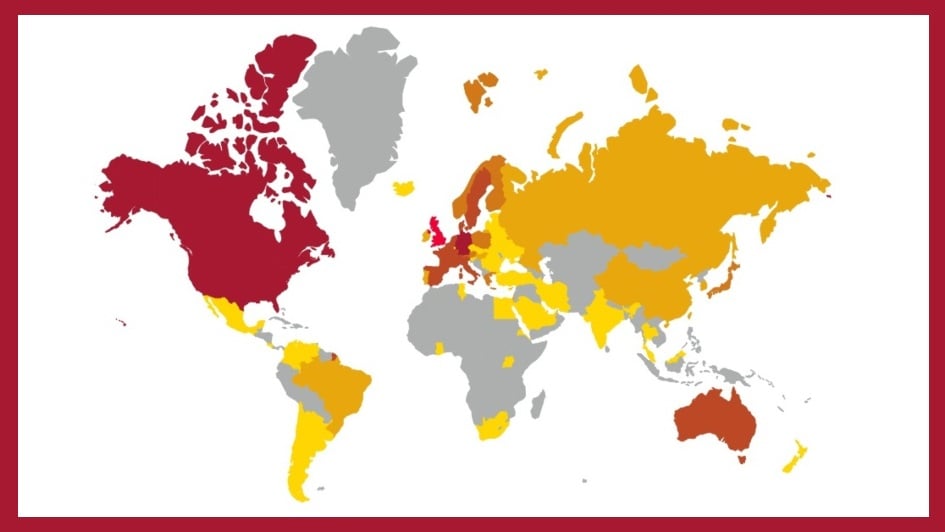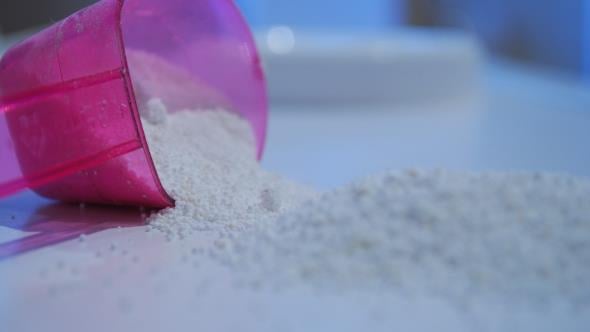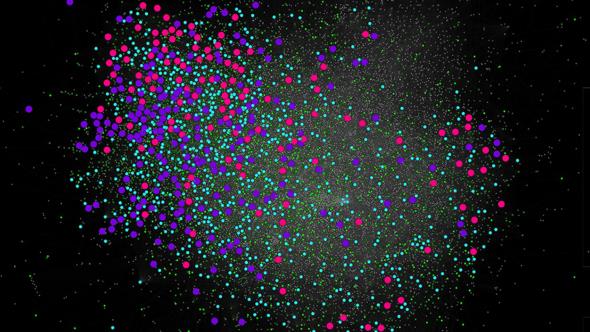
Map shows the distribution of author affiliations from papers published by ICR scientists (2015–2016). See this feature article for more information.
Cancer is predicted to be the leading cause of death worldwide in the coming years with an increase to 21.6 million new cases each year by 2030 according to estimates from the World Health Organisation's International Agency for Research on Cancer.
Today is World Cancer Research Day, a worldwide initiative to promote cancer research, with the eventual aim of defeating cancer.
Cancer research is essential to finding ways of slowing the progression of the disease and further improving survival rates and quality of life for those affected.
We’re highlighting some of the ways researchers at The Institute of Cancer Research, London, work with other scientists around the world to better understand the disease and improve cancer treatment.
A low cost, but powerful way to boost radiotherapy

Image: Bleach powder. Image credit: Pixabay.
Radiotherapy is one of the most effective ways to treat a host of cancer types, and it is widely accessible to many people around the world.
Radiotherapy is effective because tumour cells are generally more sensitive to radiation than healthy cells, so a lethal dose kills tumours without causing widespread damage to surrounding tissue.
Researchers are continually searching for new ways to improve radiotherapy by developing sophisticated equipment that can deliver treatment more precisely, or by finding compounds that make tumour cells more sensitive to radiation. While these techniques can and do improve outcomes for patients, they can also be expensive to implement, making them beyond the reach of patients in poorer parts of the world.
But a chemical called hydrogen peroxide could be a cheap and easy way to improve radiotherapy for everyone, and our researchers are helping to test just how effective the combination could be in breast cancer.
You might well have heard of hydrogen peroxide because it’s been around for years. It’s used to produce products like washing detergents, and at low concentrations it can be used as an antiseptic, or even to bleach hair.
Hydrogen peroxide is an oxidising agent which breaks down to release water and oxygen, and in tumours a dilute solution of hydrogen peroxide damages cancer cells, making them more susceptible to radiation.
An added bonus is that as hydrogen peroxide breaks down, the release of oxygen helps reduce hypoxia in tumours, where cancer cells have adapted to survive with less oxygen. Hypoxia is linked to increased resistance to radiation, so the release of oxygen helps counteract the cells’ ability to survive radiotherapy – further boosting the effects of treatment.
Studies in Japan have shown that in a small group of patients treated for breast cancer with radiotherapy and a hydrogen peroxide treatment, over 90% of the group showed no signs of the disease nearly five years later. This is considerably better than treatment with just radiotherapy alone.
Scientists at The Institute of Cancer Research (ICR) and The Royal Marsden NHS Foundation Trust led by Dr Navita Somaiah have carried out an early-stage clinical trial that shows using the hydrogen peroxide treatment to sensitise tumour cells to radiotherapy poses no risks to patients, and they are in the process of setting up a larger randomised clinical trial in patients with breast cancer to hopefully confirm the results seen in Japan.
Dr Somaiah said: “What’s so encouraging about using hydrogen peroxide to improve radiotherapy is that it could be a universal treatment – it doesn’t target a specific weakness in cancer cells caused by a genetic mutation, so if it works for breast cancer it could work for any solid tumour.”
The team at the ICR are in negotiations to see if they can extend their trial to India, which they hope will speed up recruitment and help them to get their results faster.
This is such a fantastic example of global cooperation, and with a bit of luck, it could be helping patients all over the world in a matter or years.
Working with the best scientists in the world

Image: Big Data cloud. Image credit: Costas Mitsopoulos , Amanda C. Schierz , Paul Workman, Bissan Al-Lazikani.
Researchers at the ICR come from all over the world to work at our facilities in London, because of our global reputation for world-class research and our track-record for taking discoveries from the laboratory to the clinic where they can make a difference for patients.
We’re proud of what we achieve here, but we know how important it is to work with, and learn from, the worldwide cancer research community, and the story of Dr Albert Antolin shows this principle in action.
Dr Albert Antolin is a computational chemist in the ICR's Division of Cancer Therapeutics and the Department of Data Science. He’s leading a multi-institutional project, working with companies in artificial intelligence (AI) and pharmaceuticals, to expand the use of cancer drugs in patients.
Albert has had an interesting journey in his career as a cancer scientist so far.
Born and educated in Spain, he studied organic chemistry and worked at a pharmaceutical company in Barcelona as a molecular modeller, before completing a PhD in Systems Pharmacology.
Albert made the move to London to work at the ICR because it’s one of the best academic drug discovery centres in the world, with a unique mix of drug discovery and academic research he wasn’t able to find elsewhere.
Albert is interested in bridging the gap between drug discovery in industry and the much-needed understanding of the fundamental questions important to cancer biology, and he’s helping to uncover new targets of cancer drugs that could explain why they are effective in some patients and not others.
He is developing scientific resources to help cancer researchers in the field of chemical biology, such as canSAR – a knowledge base for translational cancer research and drug discovery, and Probe Miner – a resource that uses publicly available data to help researchers assess and select chemical probes for studying potential targets for cancer drugs.
We're building the Centre for Cancer Drug Discovery, which will pave the way for a new era of drug discovery; predicting the course of cancer evolution and designing new drugs to target the underlying processes.
Find out more
Albert is using machine learning to identify new targets of old drugs that could potentially be repurposed in cancer, working with Professor John Overington at the Medicines Discovery Catapult (MDC) based in Cheshire – a pioneer in the application of artificial intelligence methods in drug discovery.
And currently, he is at Columbia University in New York to work with Professor Andrea Califano, a world expert in computational biology.
Professor Califano has been applying network biology methods to understand targeted cancer medicines, and Albert is exploring how network biology could uncover unexpected effects of drugs to better tailor them to patients.
Reaching out to work across disciplines and with leaders in their fields is what brought Albert to London, and he describes the importance of these collaborations to his research:
“These two research visits have been incredibly rewarding not only in terms of skills development and networking but also inspiring regarding how multi-disciplinary research and collaboration can enable us to tackle challenges that would be difficult to solve from one discipline alone.
“I am really thankful to the Wellcome Trust for enabling and encouraging me to actively reach out to perform these research visits and to step out of my comfort zone and learn from world experts in their respective disciplines. It is really a privilege.”
Working together to help study rare cancers, and expand horizons
-590x332.tmb-0590x332.jpg?sfvrsn=c30a2569_1)
Image: Sarcoma Molecular Pathology Team.
When it comes to rare cancers, researchers need to work together to achieve the best results. In the UK, some of the rarest types of cancer may only be diagnosed in dozens or hundreds of patients a year, which can limit the ability of researchers to study cancer, or the level of expertise available.
One such rare cancer is Ewing sarcoma, a disease where the ICR is one of the leading centres for its study in Europe.
Sarcomas are a group of rare cancers that can affect any part of the body. They disproportionately affect children and young adults, and outcomes can be very poor for sarcoma patients.
The ICR and The Royal Marsden recently launched the Joint Sarcoma Research Centre, to pool our resources to propel our sarcoma research to the next level. Its ultimate goal is to deliver practice-changing discoveries for patient benefit and improve cure rates in these rare cancers.
Ana Teresa Monteiro Amaral is a postdoctoral researcher from the Institute of Biomedicine of Seville in Spain, and she recently spent a few months working at the ICR with Professor Janet Shipley, co-director of the Joint Sarcoma Centre at the ICR.
Professor Shipley and her team are developing new models to research Ewing sarcoma in the lab, and Ana learned to grow tumour spheres from cell samples of the disease. These spheres better reflect the conditions of sarcomas that develop in the body than traditional cell cultures, so they are better suited to help understand how cancer cells respond to potential drugs.
Ana was interviewed about her time spent at the ICR, and she said the experience was extremely beneficial:
“I have been working in Ewing Sarcoma for several years and I was aware that the ICR was developing new models for pre-clinical research. The ICR is one of the few groups in Europe working on this specific subject.
“In my home lab, we lack expertise in the generation of spheres from tumour cells. Thanks to my stay, we are now able to generate 3D models from tumours and evaluate predictive biomarkers of response after drug treatment. In fact, we have already successfully started to generate these models from patients samples derived from different types of sarcomas.”
By sharing our expertise with researchers like Ana, the ICR is helping to improve the knowledge base for this rare cancer, which she can take back to Spain to help her colleagues and hopefully patients with Ewing sarcoma.
The Sarcoma Molecular Pathology Team is investigating ways to improve therapeutic strategies that will improve the treatment of patients with these sarcomas.
Find out more
Working together with a common goal
Like any field of science, cancer research benefits enormously from researchers working together to speed up the discoveries that will help patients with the disease.
Our researchers are committed to making the discoveries that will defeat cancer and these are just a few of the global connections we are making that could make a difference for people with cancer in the UK, and around the world.
comments powered by